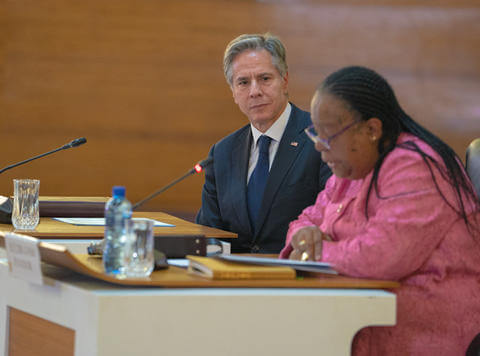Q&A: #LadyRussiagate in South Africa

Howard on Africa In-Brief
A publication of the Center for African Studies, Howard University
Q&A: #LadyRussiagate in South Africa
Written by Michael Walsh
May 23, 2023
Two weeks ago, the U.S. Ambassador to South Africa, Reuben Brigety, disclosed the existence of intelligence that reportedly shows that there was an arms transfer involving a sanctioned Russian ship at a South African navy base.
After the story broke, Michael Walsh, an Adjunct Fellow at the Center for African Studies, published a rapid tracing of the events leading-up to that revelation. Here are his initial thoughts on what may have happened.
What is the most important question that the casual observer should be asking about the incident?
There is a risk that some people will jump to conclusions about what happened on the basis of very limited open source information.
Whenever an arms transfer occurs, one of the first questions that should be asked is who were the parties involved in that activity.
Here, there is an allegation that there was an arms transfer at Naval Base Simon's Town, and it involved a Russian ship that was sanctioned by the United States government. But, that does not mean that the parties to the transfer were the South African government and the Russian government.
Of course, that seems like a reasonable hypothesis. However, we still haven't seen evidence that proves that's what happened. So, it is not a valid conclusion to draw.
For argument's sake, let's assume that this incident doesn't involve an arms transfer by the South African government to the Russian government. What else do you think might have happened?
I can imagine a long list of alternative hypotheses. Here are a few examples:
- The South African Special Forces could have transferred arms to its own forces or partner forces operating in Mozambique.
- Some component of the South African government, a South African private military contractor, or a South African defense company could have transferred arms to one of the conflict parties in Sudan.
- Some component of the South African government, a South African private military contractor, or a South African defense company could have transferred arms to a Russian private military contractor or Russian defense company. For example, to the Wagner Group.
- Some component of the South African government, a South African private military contractor, or a South African defense company could have transferred arms to a third party government, private military contractor, or defense company. To complicate matters further, that transfer could have involved some component of the Russian government, a Russian private military contractor, or a Russian company acting as an intermediary.
Of course, the intelligence behind the assessment could be flat wrong. And, no arms or related technologies were loaded onto the Russian ship in Simon's Town. That would be a nightmare scenario for the United States government. And, it would cause great harm to America's standing on the continent.
Aside from Russia, who else is interested in South African arms and related technologies?
There are many third party state and non-state actors who might be in the market for South African arms and related technologies. Here are a few examples:
- In Sub-Saharan Africa, Mozambique and Sudan are candidates. The Russian ship reportedly stopped in their ports after departing South African waters. And, there are armed conflicts being waged in both countries.
- On the Arabian Peninsula, Saudi Arabia and the United Arab Emirates are possibilities. In the past, the South African government has blocked arms transfers to these countries over inspection disputes.
- Across Asia, China would be interested in acquiring South African arms and related technologies - especially any that would advance its cyber, missile, space, and weapons of mass destruction capabilities.
To be clear, we still don't know the specifics of the arms or related technologies that were supposedly loaded onto the Russian ship at Naval Base Simon's Town. So, it is difficult to narrow down the list to a dirty dozen. Perhaps the United States Intelligence Community has the information to produce such a list. But, they have not disclosed that information to the public.
Note: This Q&A was conducted on May 18, 2023 and May 21, 2023.
Michael Walsh is an Adjunct Fellow at the Center for African Studies at Howard University and a Visiting Researcher at the School of Foreign Service at Georgetown University.
Acknowledgements:
Howard on Africa in Brief is published by the Center for African Studies at Howard University. Contributors include prominent scholars, policy makers, Howard faculty, alumni and graduate students. Our papers provide open access to research and make a global contribution to understanding Africa-related issues. The views, positions, and conclusions expressed in this publication are solely those of the author(s).
